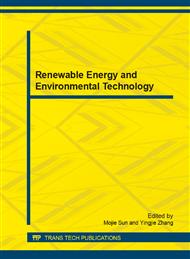[1]
Kessel P, Glavitsch H. Estimating the voltage stability of power systems. IEEE Trans Power System 1986; 1: 346-354.
DOI: 10.1109/tpwrd.1986.4308013
Google Scholar
[2]
Van Cutsem T. A method to compute reactive power margins with respect to voltage collapse. IEEE Trans Power System 1991; 6: 145-156.
DOI: 10.1109/59.131057
Google Scholar
[3]
Grudinin N. Reactive power optimization using successive quadratic programming method. IEEE Trans Power System 1998; 13: 1219-1225.
DOI: 10.1109/59.736232
Google Scholar
[4]
Lai LL, Ma J T. Application of evolutionary programming to reactive power planning-comparison with non-linear programming approach. IEEE Trans Power System 1997; 12: 198-206.
DOI: 10.1109/59.574940
Google Scholar
[5]
A.A. Salam, A.M. Khafagha, An artificial neural network application to alleviate voltage instability problem. In 2002 Large Engineering Systems conference on Power Engineering, pp.133-141, June (2002).
DOI: 10.1109/lescpe.2002.1020679
Google Scholar
[6]
K. Iba, Reactive power optimization by Genetic Algorithm, IEEE Transaction on Power System, 1994 pp.685-691.
Google Scholar
[7]
Su C. T and Lin C. T, Fuzzy based voltage/reactive power scheduling for voltage security improvement and loss reduction, IEEE Transaction on power delivery, April 2001, vol. 16, No. 2, pp.319-323.
DOI: 10.1109/61.915501
Google Scholar
[8]
Chaohua Dai, Weirong Chen, Seeker optimization algorithm for optimal reactive power dispatch. IEEE Trans Power System vol. 24, pp.1218-1230, Aug (2009).
DOI: 10.1109/tpwrs.2009.2021226
Google Scholar
[9]
A.A. Abou El Ela and M.A. Abido, Differential evolution algorithm for optimal reactive power dispatch. lectric power system research, 2011, vol. 81, pp.458-464.
DOI: 10.1016/j.epsr.2010.10.005
Google Scholar
[10]
D.G. Mayer, B.P. King Born, Differential Evolution an Easy and efficient evolutionary algorithm for model optimization, Agric. System 83 (2005) 315-328.
Google Scholar
[11]
Devaraj D, Yegnanarayana B , A combined genetic algorithm approaach for optimal power flow, National power system conference NPSC 2000 India 2000, pp.1866-1876.
Google Scholar
[12]
Basu M. Optimal power flow with facts devices using differential evolution. Int J Electric power and Energy System 2008; 30: 150-156.
DOI: 10.1016/j.ijepes.2007.06.011
Google Scholar
[13]
Alsac O, Scott B, Optimal load flow with steady state security, IEEE Transaction on pwer Apparatus system 1974, pp.187-202.
Google Scholar
[14]
D. Devaraj, J. Preetha Roselyn, Genetic algorithm based reactive power dispatch for voltage stability improvement, Electrical Power and Energy Systems (2010), vol 32, pp.1151-1156.
DOI: 10.1016/j.ijepes.2010.06.014
Google Scholar


